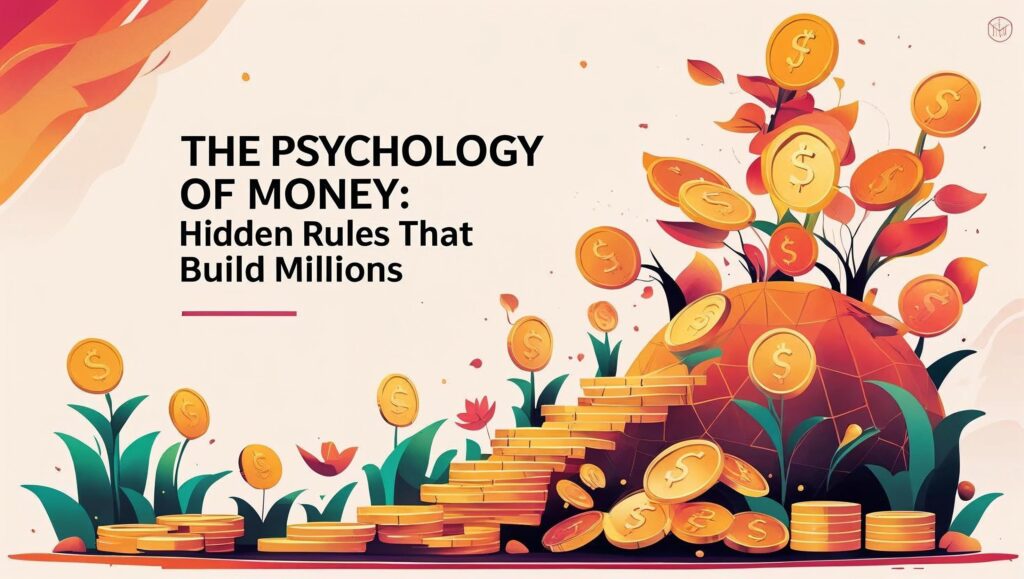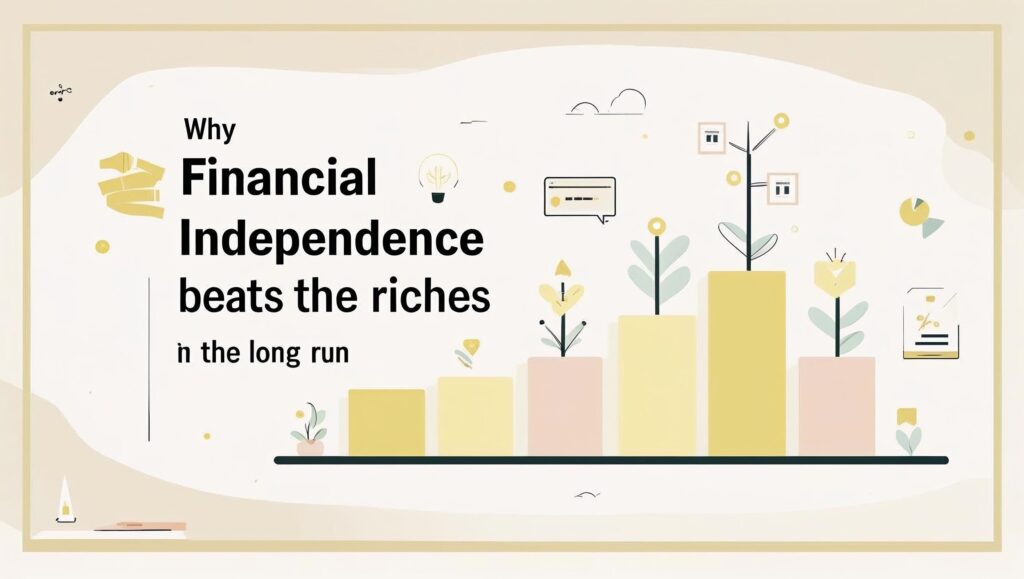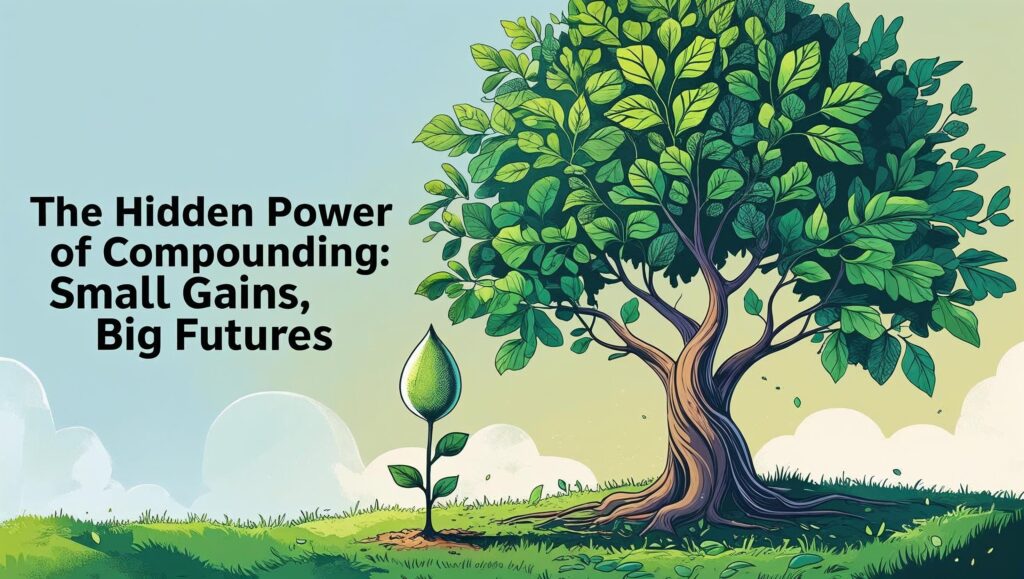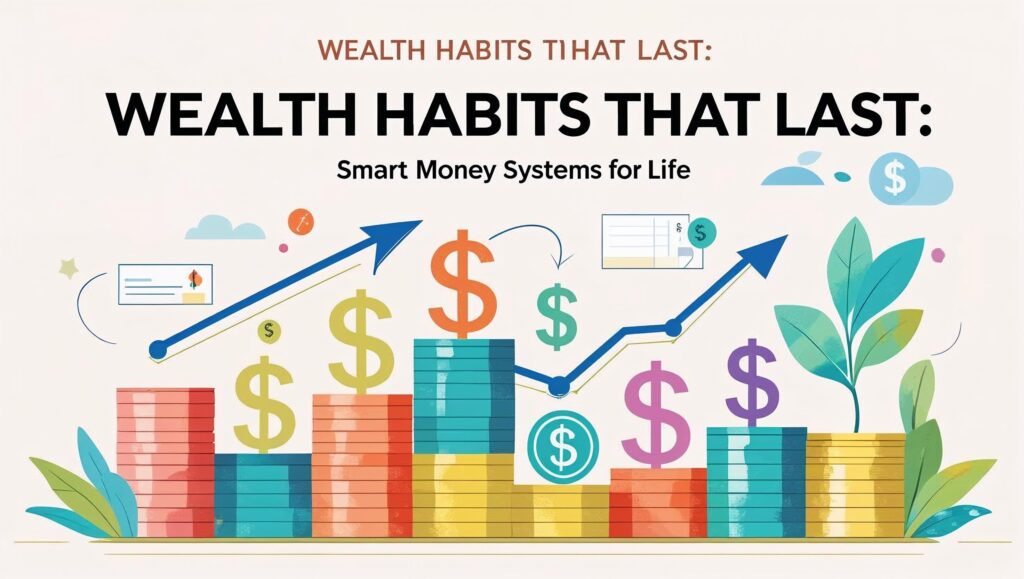
Discover 18 timeless money rules from The Psychology of Money – lessons on compounding, risk, saving, and freedom that turn small gains into lasting wealth.
Introduction: Why Psychology Outweighs Math in Money
Money is rarely about spreadsheets and calculators. It’s about emotions — fear, greed, envy, pride, and the deep human desire for freedom. That’s why the hidden psychology of money matters more than formulas.
Morgan Housel’s The Psychology of Money has become a modern financial classic because it explains wealth-building not as a science, but as a human behaviour game. As we move deeper into 2025, with volatile markets, AI-driven investing, and shifting economic landscapes, these lessons are more relevant than ever.
This blog unpacks 18 timeless insights from The Psychology of Money — combined with real-world examples and practical reflections — to show how behaviour, not brilliance, builds lasting wealth.
Everyone Sees Money Through Their Own Lens
In the Psychology of Money, one of the most powerful insights is this: nobody is crazy with money. What seems irrational from the outside often makes perfect sense when you understand someone’s history and experiences.
Take three simple examples:
- A war survivor may stash cash under a mattress for decades, not because they don’t trust banks, but because their lived reality taught them that institutions can collapse overnight.
- A Silicon Valley engineer might pour most of their savings into high-risk tech startups, confident that innovation always wins—because they’ve seen it firsthand.
- A farmer may see land ownership as the ultimate safety net, choosing soil over stocks, because their wealth is tied to harvests and tradition.
Each choice is shaped by a personal narrative. What looks “wrong” from one perspective is often entirely rational from another. This is the essence of the Psychology of Money: people don’t make financial decisions in spreadsheets, they make them in the context of their fears, hopes, and experiences.
Lesson: Stop judging others’ money habits. Instead, focus on understanding your own financial lens. The path to wealth begins when you align decisions with your reality—rather than someone else’s playbook.
The Thin Line Between Luck and Risk
Every outcome sits on a razor’s edge between luck and risk.
- Facebook refused to sell early — genius in hindsight.
- Yahoo made the same choice — and collapsed.
Both decisions felt rational at the time. Success stories often underplay luck, while failures often downplay risk.
Takeaway: Don’t build wealth strategies that depend on perfect luck. Protect yourself against wipeouts.
The Power of “Enough”
The most dangerous financial word is “more.”
- A bigger car.
- A larger house.
- A higher salary.
Without defining “enough,” people endlessly chase, compare, and burn out. Real freedom begins when you set your own finish line.
“The hardest financial skill is getting the goalpost to stop moving.” — Morgan Housel
Compounding: The Quiet Superpower
In the Psychology of Money, compounding isn’t just a mathematical trick – it’s the quiet miracle that rewards patience more than brilliance. It works slowly, almost invisibly, until one day the results seem extraordinary.
Warren Buffett – The Case Study:
- Started investing at age 10, proving the value of starting early.
- By his 30s, he was financially secure, but not yet a billionaire.
- The real explosion in wealth came later — 90% of his fortune was built after age 65.
- Lesson: It wasn’t extraordinary returns that made him rich, but consistent, long-term compounding.
Why Compounding Works
- Small gains multiply when left untouched.
- Patience beats intelligence — steady returns outlast risky bets.
- Time is the real multiplier, not chasing “the next big thing.”
- Applies beyond money: habits, knowledge, and even relationships compound with consistency.
The Psychology of Money shows us that compounding is the ultimate equalizer. You don’t need brilliance — you need time, discipline, and the humility to let small actions grow into life-changing results.
Getting Wealthy vs. Staying Wealthy
Two very different skills:
- Getting wealthy requires optimism, risk-taking, and courage.
- Staying wealthy demands humility, frugality, and paranoia.
Mike Tyson earned over $400 million in his career and lost nearly all of it through reckless spending. Meanwhile, quiet investors with average returns sustain wealth for decades.
Build habits to protect wealth as fiercely as you chase it.
Tails Drive Outcomes
Markets are not fair averages — they are shaped by a few outliers.
- Amazon, Apple, and Microsoft drove most of the stock market’s growth.
- 95% of startups fail, yet the few survivors tilt the curve upward.
You don’t need to predict the next unicorn. Stay invested broadly and let the “tails” work in your favor.
Freedom: The Highest Dividend
In the Psychology of Money, Morgan Housel highlights that the ultimate dividend of wealth isn’t luxury cars, mansions, or status symbols — it’s freedom. True financial independence buys the one thing you can’t manufacture: control over your time.
What Freedom Really Means
- Freedom to say “no” — to toxic workplaces, bad clients, or draining commitments.
- Freedom to say “yes” — to family dinners, spontaneous trips, or passion projects.
- Freedom from fear — of bills, debt, or sudden emergencies.
- Freedom with time — the ability to wake up and choose how to spend your day.
Why It Matters More Than Luxury
- Luxury goods fade, depreciate, or lose their charm.
- Freedom, once earned, compounds joy every single day.
- A bigger paycheck without freedom often means more stress; freedom means peace of mind and flexibility.
- The Psychology of Money teaches that true wealth is measured in hours of freedom, not the size of a paycheck.
Consider professionals who trade long hours for high salaries – often they’re “rich” on paper but starved for time. Contrast this with financially independent individuals who live modestly but enjoy the dividend of choice – the freedom to design their lives.
Deep Lesson from the Psychology of Money
The book explains that financial success isn’t just about accumulating assets — it’s about shaping a life you don’t need to escape from. That’s why many who follow the Psychology of Money philosophy prioritize independence over riches, finding joy in freedom rather than possessions.
The Psychology of Money reminds us that the richest people are not those with the most, but those with the freedom to live on their own terms. Time, not luxury, is the greatest dividend wealth can buy.
Wealth Is What You Don’t See

A luxury car signals spending, not saving. Real wealth is invisible:
- The investments you don’t post online.
- The cash reserves that no one notices.
- The quiet financial resilience you’ve built.
People flaunting riches may not be wealthy. The wealthiest are often the most understated.
Saving Is More Powerful Than Income
Income builds opportunity. Savings build freedom.
- A high salary with zero savings = fragile.
- A modest salary with steady savings = independent.
Your savings rate matters more than your paycheck.
Be Reasonable, Not Just Rational
We are not robots. A perfect spreadsheet plan is useless if it collapses under stress.
- A slightly “imperfect” but sustainable plan is better than an ideal one you abandon.
Build a financial plan you can actually live with.
History Surprises More Than It Repeats
Every crisis feels unprecedented — and in many ways, it is.
- The 2008 housing crash was not the 2000 dot-com bubble.
- The COVID-19 pandemic was not the 1918 Spanish Flu.
History rhymes, but it rarely repeats. Build resilience, don’t predict exact futures.
Always Leave Room for Error
In World War II, German tanks were disabled because mice chewed on their wiring.
Wealth lesson: Unexpected, small shocks can cause big failures.
- Hold cash reserves.
- Diversify investments.
- Live below your means.
Margin of safety = survival.
You Will Change
What you want today may not be what you want in 20 years.
- A job you love now may burn you out later.
- Your dream house may feel like a burden tomorrow.
Plan for flexibility. Avoid rigid financial blueprints that ignore life’s changes.
Nothing Comes Free

Even “passive” investing has a cost: patience during volatility.
- Every dip tests your emotions.
- Selling early kills compounding.
Volatility isn’t punishment — it’s the price of admission for long-term growth.
Play Your Own Money Game
Not everyone plays the same financial game.
- A retiree invests for stability.
- A startup founder invests for exponential growth.
Rule: Define your money game. Don’t copy others blindly.
Optimism Builds, Pessimism Captivates
Bad news sells. Doom headlines trend faster. But history shows resilience:
- After world wars.
- After market crashes.
- After pandemics.
Long-term, optimism pays.
Accept That You Don’t Know
Most financial forecasts are wrong. What works?
- Save consistently.
- Diversify broadly.
- Prepare for uncertainty.
Humility beats prediction.
Final Takeaway: Wealth Is Behaviour, Not Just Math
At its core, wealth is built in the mind, not the market.
- Define “enough.”
- Save patiently.
- Invest simply.
- Value freedom over luxury.
Wealth is not about outperforming others. It’s about creating a life where you can sleep peacefully at night.
Summary
- Money decisions = behaviour, not spreadsheets.
- Define “enough” to avoid endless chasing.
- Compounding rewards patience more than brilliance.
- Real wealth is invisible — savings and resilience.
- Freedom of time is the ultimate dividend.
FAQ
What does “everyone sees money through their own lens” really mean?
It means that people make money decisions based on their personal experiences. A war survivor may hoard cash, while a tech worker might bet on startups. Neither is “crazy” — both are responding to their reality.
Why is “enough” such an important concept in money?
Because without a personal definition of “enough,” you will always chase more. Defining it gives you peace and keeps you from falling into the endless cycle of comparison.
How did Warren Buffett prove the power of compounding?
Buffett didn’t earn his wealth overnight. He started investing as a child, stayed consistent, and allowed decades of compounding to multiply his money. Over 90% of his fortune came after the age of 65.
What’s the difference between getting wealthy and staying wealthy?
Getting wealthy often requires optimism and taking risks. Staying wealthy needs caution, humility, and discipline so you don’t lose what you’ve built.
Why does the book call freedom the “highest dividend”?
Because true wealth isn’t about luxury items — it’s about control over your time. Freedom lets you say yes or no on your own terms, which is more valuable than status symbols.
Why do markets depend so much on “tails” or rare outcomes?
Because a handful of companies like Apple or Amazon can drive most of the market’s growth. Your success doesn’t depend on predicting them, but on staying invested so the rare winners lift your portfolio.
How does psychology affect saving more than income levels?
A person earning modestly but saving consistently often builds more security than someone with a huge salary who spends it all. Behaviour matters more than numbers.
Why is it important to leave room for error in finance?
Because unexpected events — like sudden job loss or a market crash — can derail even the smartest plan. A margin of safety (extra savings, diversification) protects you when surprises hit.
What’s the danger of copying someone else’s money strategy?
Not everyone plays the same game. A retiree investing for safety shouldn’t follow the same plan as a young founder chasing growth. Playing the wrong game leads to frustration and poor results.
Why do pessimistic financial headlines get more attention than optimistic ones?
Because fear grabs people’s emotions faster. But history shows that optimism, patience, and resilience win in the long run, even after wars, recessions, or pandemics.



